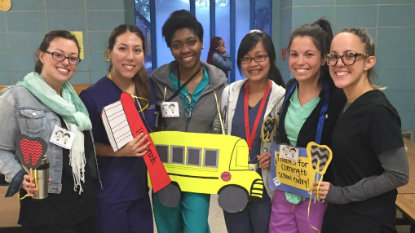 The local school is more than just a place for educating kids. For many neighborhoods it is a de facto community center, providing social services, food and clothing, and basic health services for both students and families in need where there are no affordable alternatives in place.
The local school is more than just a place for educating kids. For many neighborhoods it is a de facto community center, providing social services, food and clothing, and basic health services for both students and families in need where there are no affordable alternatives in place.
At The Historic Samuel Coleridge-Taylor Elementary School in West Baltimore, a successful partnership between the University of Maryland School of Social Work (UMSSW) and School of Dentistry (UMSOD) has helped bridge the oral education and care gap in a community that has limited options when it comes to dentistry.
“Children have so many needs that dental care often gets swept under the rug,” said Dr. Clemencia Vargas, associate professor at UMSOD in the Department of Orthodontics and Pediatric Dentistry, “We didn’t see any signs of dental treatment on our first visit, and 40 percent of kids had active decay.”
Vargas' career has included dental practice, research, and teaching in her native Colombia and the United States. Yet some of her greatest satisfaction and pride has come from organizing oral care outreach efforts for underserved schools, including a successful 10-year partnership with Wolfe Street Academy in East Baltimore. Samuel-Coleridge Taylor presented the types of challenges that Vargas has become familiar with in Baltimore City. In an effort to address oral health gaps, Vargas engaged in a collaboration with SSW through the Promise Heights initiative. This is a partnership between UMB and community-based non-profits and faith-based organizations to improve the educational, social, health, and economic opportunities of children from birth to young adulthood in Upton/Druid Heights.
In order to effectively implement this program, UMSSW employs an onsite facilitator at Samuel Coleridge Taylor – Angel Bettleyon, LSW – who serves as a mental health consultant at the DRU Judy Center located at the school, which serves families and children from birth to five years old. Given her first-hand experience working with the school community, Bettleyon is aware of how lack of dental care can have subtle effects on student behavior:
“If you have a terrible toothache, and if you can’t communicate that and nobody’s aware, then it will affect your performance.”
Over the first year, the Promise Heights initiative has made gradual progress in assisting parents to obtain oral care for their children, providing fluoridated toothpaste, toothbrushes, and cavity prevention kits to the students of Samuel Coleridge-Taylor elementary. In a community that’s often been ignored, building trust is an essential first step for families who may be wary of authority figures.
A major part of building trust is generating comfort between the student volunteers of UMSOD and children and parents. To this end, Promise Heights engaged in a “walking school bus” activity, in which UMSOD students dressed up in costumes, met with families and children and walked with them to school. Bettleyon also helped to arrange two breakfasts – one in the Spring and Fall - between the dental volunteers and the students and parents at the school.
“Through these activities, the dental students are able to meet with the parents and chat with them in a different light, to see the parents as parents,” said Vargas.
In addition to engaging the community through activities like the walking school bus and the monthly breakfasts, UMSOD volunteers engaged in four screening events over the course of the year to provide oral health education and help parents settle into brushing routines with their kids. They distributed oral health starter kits to parents with children's pajamas, a new book, a cavity prevention kits under a “Brush, Book and Bed” initiative to help facilitate and support a consistent bedtime brushing routine.
“If parents are dealing with mental health issues, it impacts the way they respond to their children’s needs, and for others, it’s a lack of understanding or prioritizing other needs over a consistent routine,” said Bettleyon, “so many of these families were very thankful for the dental kits because it’s something they may not have been able to buy on their own, especially with their resources already being stretched so thin.”
Through the first year, the program has experienced progress: the number of signed consent forms has increased, and attendance has continued to rise at each of the educational events for parents held during the school year. As a result of this progress, Promise Heights received a second year grant of $27 thousand from the Thomas Wilson Sanitarium for Children of Baltimore City to continue provide education and screening services under the “No Cavities Here!” initiative.
Vargas credits the strong, steady leadership of the school for creating the type of environment that allowed “No Cavities Here!” to continue past its first year. For underserved schools, consistent leadership is often the difference between a successful intervention and a failed one, and Vargas credits Bettleyon, and Promise Heights in particular, for helping the program flourish.
“Angel Bettleyon is a fundamental piece. If we didn’t have her, we wouldn’t be able to work there,” Dr. Vargas said, “Promise Heights makes it easy, they have the connection with the community, they have the presence, and they are very pleased with the program. This program is succeeding because of how all of these have come together.



